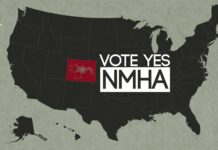- Changing the Psychedelic Political Narrative at the Local Level: Denver 2019 - May 3, 2019
- Psychedelic Markets of the Future - January 8, 2018
On election day, May 7, the voters in Denver, Colorado, will see on their ballots a proposal to decriminalize the personal possession, use, and cultivation of psychoactive mushrooms. It will be the first day in modern history on which the citizens of a political jurisdiction in the United States can vote directly to change public policy on a psychedelic substance.
The campaign to put a mushroom decriminalization initiative before the voters started in 2017. After the Denver Board of Elections rejected the language of an earlier initiative at the beginning of 2018, Kevin Mathews, the new campaign director, contacted me to discuss how to proceed. Throughout the summer and fall we researched possible models for an initiative; created a first draft, based on Denver’s earlier cannabis decriminalization initiative; consulted with other drug policy reform advocates, and with Colorado attorneys; and responded to the Board of Elections’ comments and questions about the language of the initiative. In October, the Board of Elections certified the initiative, making it eligible for inclusion on the ballot, subject to collecting sufficient signatures. Kevin mobilized an army of volunteers that succeeded in obtaining those signatures. He is continuing to orchestrate a multi-front campaign to turn out the vote next week in support of the initiative, which is designated “Initiative 301.”
What Initiative 301 Does
If the initiative passes, it will not legalize the sale of psychoactive mushrooms, or any other commercial activity. The purpose is to prevent local officials from imposing criminal penalties for the “personal possession” of personal-use amounts of “psilocybin mushrooms.” “Psilocybin mushrooms” are defined as “fungal matter containing psilocybin, psilocin, baeocystin, or no-baeocystin.” “Personal possession” is defined as “the possession, storage or propagation of psilocybin by an adult for personal use, where the psilocybin mushrooms are not used or displayed in public”; the definition specifically excludes the sale of psilocybin mushrooms for remuneration.
There are three provisions in the initiative:
- The first makes enforcement of any laws imposing criminal penalties for the personal use and personal possession of psilocybin mushrooms the lowest law enforcement priority in the City and County of Denver.
- The second prevents all departments, boards, commissions, offices, and employees of the city from using any city funds or resources to assist in the enforcement of those laws.
- The third requires the Mayor to appoint a Psilocybin Mushroom Policy Review Panel “to assess and report” on the effects of the new law. It specifies the categories of persons to be included in the Panel, and requires that the Panel establish reporting criteria for the Denver Police Department, the Denver Sheriff Department, and the Denver City Attorney’s Office to report psilocybin arrests and prosecutions. It requires the Panel to “submit a comprehensive written report with recommendations to the City Council that will include, but not be limited to, information concerning the public safety, public administration, public health and fiscal impacts” of the new law.
Decriminalization of a Very Small Part of the “Supply Side” of the Market
I-301 specifically decriminalizes a very small—but very important—part of the supply side of the market; as noted above, the City will be restricted in imposing criminal penalties for cultivation of psilocybin mushrooms for personal use. Decriminalization of the supply side—at least in some degree—is an elemental step.
Mandating an Assessment of Psychedelic Policy
After a year of watching the progress of Decriminalize Denver, and with the perspective of the cannabis legalization fight that is taking place simultaneously in New York, it seems to me that the most significant part of the initiative in the long term is the Policy Review Panel. Mandating that the government conduct an evaluation of psychedelic control policy is probably the most revolutionary thing that can be done.
What has been missing since the inception of psychedelic prohibition is an assessment of the effect and wisdom of that policy choice. Instead, psychedelics have been trapped in Schedule I of the federal Controlled Substances Act, an iron prison from which none escapes; the Drug Enforcement Administration has misconstrued the Controlled Substances Act to mean that the agency need not hold a hearing on the proper classification of a drug until presented with the equivalent of the results of the massive clinical trials that are needed for the Food and Drug Administration to approve the sale of a new drug. That standard (which does not exist in federal law) is functionally impossible to meet. It’s been fifty years since psychedelic prohibition began, and there has never been a reappraisal informed by current scientific knowledge of whether psychedelics really should be in Schedule I, or even whether there should be a Schedule I.
However, lower levels of government (state, county, and municipal levels) can conduct their own research and policy assessments and report their findings, especially if the voters insist. The report mandated by I-301 would present an important opportunity for Denver’s government to conduct groundbreaking research on psilocybin, the history of psilocybin mushrooms, and the culture of psilocybin users, and to formulate criteria for qualifying and quantifying effects of decriminalization.
There is no reason to expect that the federal government will begin reviewing the historical record and current data on psychedelics. In the absence of any federal movement towards coming up with an evidence-based psychedelic control policy, it is analysis conducted by state and local governments that will fill in missing knowledge and provide the basis for policy evolution.
A Psychedelic Constituency
No matter what happens on May 7, the organizing of the Decriminalize Denver campaign has already demonstrated the existence of a previously-unknown “psychedelic constituency,” i.e., a part of the voting public to whom psychedelic policy is important and who may even consider psychedelic regulation a policy priority. The most important message coming out of Denver is that “how to handle psychedelics” is a legitimate policy question; for example, Denver Mayoral candidates were asked whether they support the initiative. The national size, strength, and composition of the psychedelic constituency is presently unknown, since Denver is the first place in which it has been called to mobilize. However, there is now discussion of psychedelic decriminalization initiatives in other jurisdictions, both state and local, and it will be instructive to see who steps out in support of psychedelic policy reform.
Take a minute to browse our stock:
Did you enjoy reading this article?
Please support Chacruna's work by donating to us. We are an independent organization and we offer free education and advocacy for psychedelic plant medicines. We are a team of dedicated volunteers!
Can you help Chacruna advance cultural understanding around these substances?
















